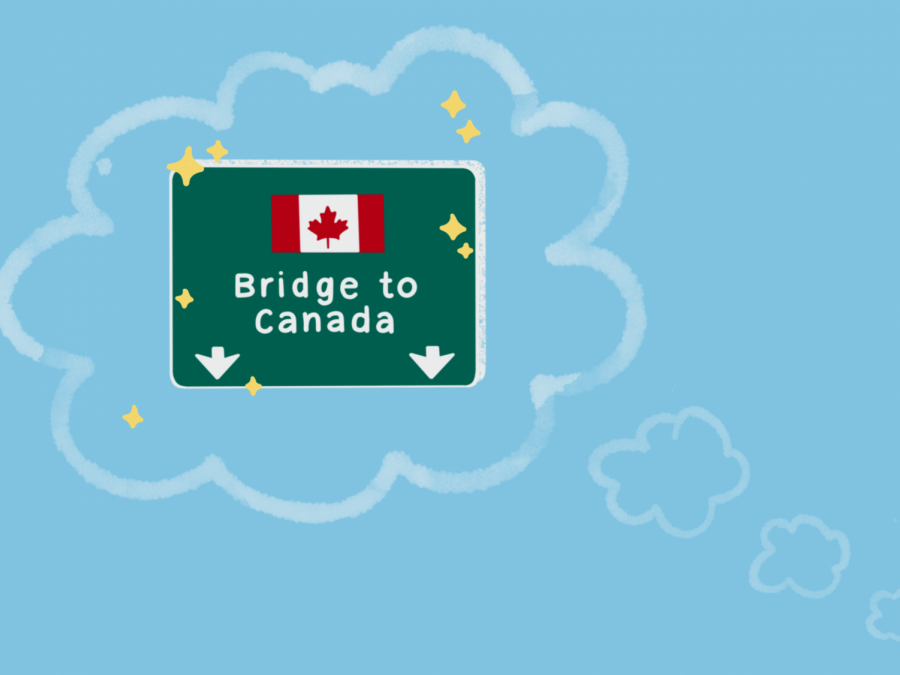Opinion | Romanticizing Canada takes away from the nation’s serious issues
October 18, 2020
More than 73 million people tuned in for the disaster of a debate between former Vice President Joe Biden and President Donald Trump held last month. That same night, Google reported a peak number of searches for “How to apply for Canadian citizenship” in the United States.
This spike in Americans frantically searching for how to move north is not a new phenomenon — in fact, many Americans express interest in relocating to Canada after a high-tension political moment. Searches also peaked after President George W. Bush’s 2004 reelection, and the highest point in the last five years occurred after the 2016 election.
Americans view Canada as most favorable out of all countries, and we often hear people claim they’ll move to Canada if a political outcome doesn’t go their way. Yet, few Americans understand important political issues in Canada. This creates a romanticized version of the nation, taking away from the severity of Canadian issues, instead of shedding light on them and calling for change. We should be just as critical of Canada as we are our own country.
One of the most important political issues in the United States right now is racial justice. The killing of George Floyd at the hands of Minneapolis police officer Derek Chauvin and the subsequent protests that began this May has served as a racial reckoning for millions of white Americans — as well as people around the world — who had previously been privileged in ignoring the problem of racism. Since then, protests have continued and race has become an even more politicized topic. This was true for the debate where Trump declined to denounce white supremacy and caused an increase in Canada searches.
It would be ignorant to deny America’s insidious and persistent problem of racism that permeates through our institutions. It is past time that Americans wake up to the racial injustices in our country. But in viewing Canada through rose-colored glasses, we fail to criticize Canada’s own racist institutions.
The history of racism and its subsequent effects are different in Canada, but they are just as horrendous. This column could not possibly attempt to explain all of the racism in the nation, but to briefly introduce the issue, it is worth noting that Black Canadians are more likely to be arrested, charged or have force used against them during interactions with police. Black Canadians have a lower annual income, are more likely to be unemployed and experience more hate crimes than any other racial group.
Indigenous communities in Canada also face disturbing levels of structural and systemic discrimination. First Nations people in Canada face high rates of incarceration, poverty, unemployment, suicide, addiction, health issues and other social problems. Human Rights Watch, a nonprofit that investigates abuses across the globe, cites that more than 50 First Nations communities across Canada have inadequate access to clean, safe drinking water. The Canadian Human Rights Tribunal found last year that the federal government was “willfull and reckless” in its discrimination against Indigenous children. The United Nations Human Rights Committee reported that as of 2019, Canada was still discriminating against First Nations women and their descendants through the controversial Indian Act.
Unfortunately, Canada’s racist practices do not stop there. White supremacist groups spread hate across Canada just as they do in the United States. Xenophobia and Islamophobia are alive and well above the border, as well. And, what may come as a shock to many Americans, Canada has a higher number of anti-Asian racism reports per capita than the United States.
Trying to pick whether racism is “better” in the United States or in Canada is a pointless task because racism comes in many forms, and each is harmful. Racism may take different forms in Canada than in America, but it is important to recognize that this does not mean that it is the perfect multicultural safe haven it so often appears to be. Failing to see these shortcomings just fuels this romanticization, hindering actual progress.
Another important issue in the United States is the environment and climate change. Again, Canada is not free of environmental controversies. Similar to the Dakota Access Pipeline in the United States that has been the source of protest for more than three years, there is a history of Canadian natural gas pipelines cutting through Indigenous Canadian lands. Canada is home to a large portion of the world’s mining companies, which contributes to increased pollution and decreased biodiversity — not to mention serious human rights abuses. It’s true that Canada is ahead of the United States on many environmental issues, but both countries have a lot of progress to make. Idealizing Canada does nothing to put pressure on the government to make these necessary changes.
Also worth noting is that, just like in the United States, there are some pretty terrible politicians in Canada. Similar to Trump’s controversial debate stance, Canada’s 14 first ministers — which includes Prime Minister Justin Trudeau and Canada’s 13 provincial and territorial premiers — could not agree on using the term “systemic racism” in a joint statement condemning racism. The rise of far-right rhetoric in the country is reflected in the rise of ultra-conservative leaders. Beloved Prime Minister Trudeau has had more than his fair share of controversies, including accusations of sexual assault, multiple photos of him in blackface and violations of Canadian ethics laws. Of course, no politician is without flaws, but many Americans fail to hold Canadian leaders to the same standard as they do American ones, which just perpetuates the unearned idolization of Canadian politics.
Canada and the United States are different in many ways. Some issues are better handled in Canada, but others are worse. And, more importantly, comparing the two nations is a dangerous game — just because one country handles a problem “better” than the other does not mean the problem is resolved. Canada has a troubled record just like the United States does, and looking at our neighbors to the north with a soft focus just takes attention away from the severity of the issues. We should hold Canada to the same standard as we do our own nation in order to create a better world for Americans and Canadians alike.
Loretta primarily writes about politics. Write to them at LMD120@pitt.edu.



